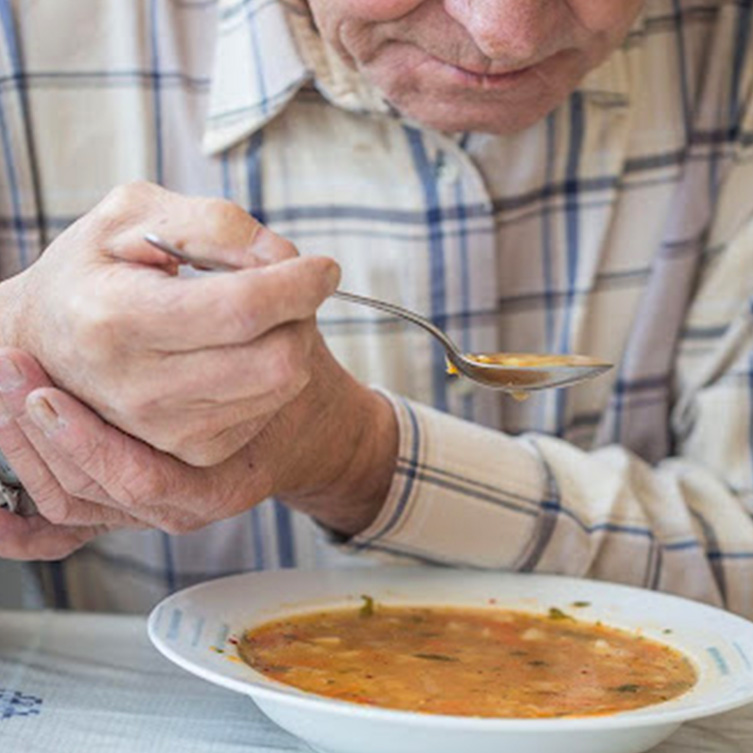Mobility Solutions for Patients with Parkinson's in Houston
Parkinson’s disease is a chronic and progressive nervous system disorder that affects movement.
The signs and symptoms of Parkinson’s disease can vary by person. Early signs may be mild and often go unnoticed. Symptoms often begin on one side of your body and usually remain worse on that side. Signs and Symptoms may include: tremors, slowed movement, rigid muscles, impaired posture and balance, loss of automatic movements, speech and writing changes. Contact us for more information

Helpful Products
This disease impacts people in different ways. Not everyone will experience all of the symptoms listed below nor will everyone experience the same intensity of symptoms. There are 5 defined stages of Parkinson’s disease.
- Stage one consists of mild symptoms. Tremors occur on one side of the body only. Changes start to occur in posture, walking and facial expressions.
- Stage two is where symptoms begin to worsen. Tremors and rigidity now affect both sides of the body. Walking problems may become apparent. The patient may still be living alone but daily living activities are becoming more difficult.
- Stage three is considered mid-stage. Loss of balance and slowness of movements are the key factors of this stage. Falls are much more common. The patient can still be fully independent but the symptoms begin to significantly impair daily living activities.
- In Stage Four, symptoms are severe and limiting. Patients may still be able to stand on their own but will likely need a walker. In this phase, the patient needs help with daily living activities and can no longer live alone.
- Stage five is the most advanced. Stiffness in the legs may make it impossible to stand or walk. The patient will require a wheelchair and around the clock care. They may also experience hallucinations or delusions.
LiveWell has a wide range of mobility products that can support independent living for patients with Parkinson’s and then assist caretakers in the later stages of the disease.
LiveWell Products that can assist with Activities of Daily Living:
Grab Bars
- Grab bars are critical in the early through late stages of the disease. Parkinson’s patients can begin to shuffle their feet as they walk which creates a major tripping concern. Grab bars help to sustain balance and prevent falls and injuries and should be installed in the shower and beside toilets. Also, grab bars should be installed in any area where there is nothing readily available to support the patient while walking. Standing grab bars are a great solution beside beds and when there are glass shower doors and no good location for mounting a traditional grab bar.
Ramps
- As Parkinson’s progresses and the patient has a harder time walking without assistance, entering and exiting may become a problem if there are stairs or uneven, rough terrain. A ramp can remove any barriers to entry and provide a safer way to enter and exit. Ramps come in all shapes and sizes and are custom fitted to the home. They can be made out of wood or metal, depending on the patient’s needs.
Stairlifts
- Living with Parkinson’s in a home with stairs can be very difficult. Oftentimes, certain areas of the home become off limits because they simply aren’t accessible. Navigating the stairs and maintaining accessibility to all rooms of the home does not have to be a difficult process. Adding a stairlift to the home removes any mobility barriers for a patient living with Parkinson’s that is still able to walk on their own. The stairlift moves on a track up and down the stairs. The seat has a seatbelt and is controlled by a device on the arm rest.
In-home elevator
- When a patient with Parkinson’s is no longer able to walk on their own without assistance, it may be time to consider adding an in-home elevator. There are several types of elevators that can be used. Standard residential elevators require a pit and an elevator shaft. LiveWell’s innovative through-the-floor home lifts require no elevator shaft and can be freestanding. An inclined or vertical platform lift is perfect for accessibility for wheelchair users. Vertical platform lifts can be used indoor or outdoor and have an open platform. They take up less space than a ramp.
Lift Chairs
- Lift Chairs are used for patients who struggle to raise and lower themselves from a seated position without help. They ensure that patients can sit and stand in a safe, controlled manner without a caregiver’s help to reduce the risk of falls or related injuries. This also helps to enhance the patient’s sense of independence and normalcy as long as possible. The comfort and safety aspect of the chair allows for patients to be comfortable while maximizing pain relief.
Power Scooters or Chairs
- Leading an active and independent life is of the utmost importance for patients with Parkinson’s, and power scooters can help them do just that in a safe and stress-free way. Power scooters are battery powered mobility devices that allow patients to travel to places without having to walk or, if close by, drive. Vehicle lifts or hitch-mounted lifts can be used to transport the power scooter or chair wherever needed.
- There are a variety of power scooters available and the type needed is based on various factors: where and how patients plan on using their scooter, specific mobility needs, and budget.
While there is no cure for Parkinson’s disease, LiveWell and our wide variety of products can help to ensure that mobility and accessibility isn’t an issue. Our products and services can make any room in the home safer and more accessible for those that are battling Parkinson’s. Contact us today to schedule a free in-home consultation. Our team of experts can evaluate the home and provide a thorough proposal of all available options. Call us at (281) 771-1469 for more information.


